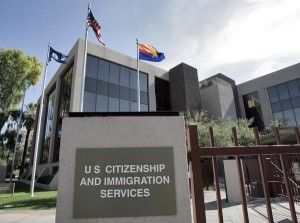The Supreme Court Strikes Down Arizona Citizenship Law
Proof of citizenship no longer required for Arizona federal election voting
By: Ken Cates, Staff Writer
With the battle for immigration reform raging in Washington, the Republican resistance against shifting demographics was delivered a crushing blow in Arizona on Monday. In a 7-2 decision, the Supreme Court voided the 2004 Arizona law requiring proof of citizenship for those registering to vote in federal elections. Only with the approval from the federal Election Assistance Commission (EAC) or a court decision overturning the EAC’s decision can anyone challenge the new requirements.
Justice Antonin Scalia, an associate justice of the Supreme Court, stated that the federal ‘motor voter’ law of 1993 “precludes Arizona from requiring a federal form applicant to submit information beyond that requested by the form itself.” The law got its name from the provision that allows people to register when applying for a drivers license, in which the federal form only asks for a signed statement by the applicant as a proof of citizenship.
The decision was also a blow to state authority regarding national elections, indicating that the similar laws of Georgia, Alabama, and Kansas may also be called into question in the very near future. Scalia pointed to the elections clause of the constitution, noting that Congress can override states in establishing the “times, places and manner of holding elections.”
The ruling was a welcoming one for Clarissa Martínez de Castro, director of immigration and civic engagement for the National Council of La Raza, a Hispanic civil rights and advocacy group and the largest of its kind in the U.S.
De Castro stated that the decision protects against the “inequalities” supposedly prevented by the motor voter law, where “Minorities, the young and the elderly would have been disproportionally impacted if the law were allowed to stand.”
Other activist groups involved in the trial, such as the League of Women Voters of Arizona and the Inter Tribal Council of Arizona, also shared De Castro’s euphoria.
“This is a strong decision protecting voters,” stated Elisabeth MacNamara, president of the League of Women Voters.
All is not lost for the Republican Party, however, which endorsed laws similar to Arizona’s as a keystone for battling the “political poison” of voter fraud in its 2012 party platform. For Arizona Attorney General Tom Horne, the options left open by the ruling “has given us a clear path to victory for the people of Arizona.”
Horne indicated that the battle was far from over when he stated, “Once we go through these steps the Supreme Court has set out, I believe we will be able to require evidence of citizenship for people using the federal form.”
For the Republican leadership of Arizona, a state which was 30.1 per cent Hispanic and 5.2 per cent native American in a 2011 census, the 2004 law was meant to combat voter fraud including those committed by noncitizens.
In its 2007 report on voter fraud, however, the Brennan Center for Justice calls the whole premise of voter fraud into question. While assessing the benefits for defrauding the polls and the corresponding risk of deportation, the report claims, “It is more likely that an individual will be struck by lightning than that he will impersonate another voter at the polls.”
In relation to policymaking, the report goes on to say, “The voter fraud phantom drives policy that disenfranchises actual legitimate voters, without a corresponding actual benefit.” Vice-President of litigation for the Mexican American Legal Defense and Educational Fund, Nina Perales, also showed skepticism for Horne’s “clear path to victory”.
Perales, along with Arizona’s Democrat senator Steve Gallardo, claim that no proof has been shown to validate the massive voter fraud by Latino voters that Republicans argue is taking place. Perales remains doubtful that they can bring forth enough evidence for a future overhaul of Monday’s ruling.
Overall, the ruling affirms the growing minority presence in the shifting demographics of America, while hindering the GOP crusade against voter fraud. The growth of U.S. minorities brings an increased influence to political elections and after Monday’s decision, the ability to vote will come with a lot less paperwork.
































Share the post "The Supreme Court Strikes Down Arizona Citizenship Law"